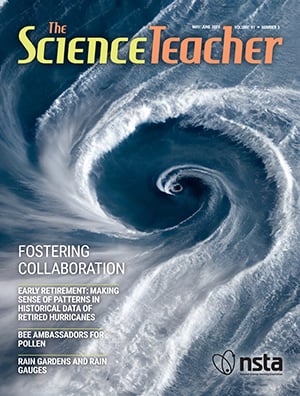All Resources
Journal Article
Program Evaluation in Formal and Informal STEM Learning Environments
Evaluation Insights is a new column about program evaluation that will help readers build their capacity as program evaluators....
Journal Article
Best Practices for STEM-Focused Mobile Instructional Spaces
Mobile instructional spaces such as retrofit buses, customized trucks or trailers, and repurposed shipping containers are innovative, unique venues for teaching and learning. STEM-focused mobile instructional spaces have emerged as vehicles for provi...
By , ,
Journal Article
A material commonly known as Flubber, with properties that are excellent for teaching about glaciers, has been widely used in geosciences education. Yet, the original recipe contains borax, which has health risks that should be avoided. A new recipe ...
By , , , ,
Journal Article
How Do You Sample a Frozen River?
Through the Sediment, Ice, & Learning on the Tanana (SILT) project, a team of university scientists engaged two middle school student groups in testing innovative environmental research technologies to measure sediment flowing underneath river ice. T...
By , , , , , , ,
Journal Article
The Learning Team at The Florida Aquarium in Tampa received funding in 2014 to create and conduct a long-term outdoor learning experience for Hillsborough County, Florida, fifth-grade students. The program was designed with four parts to optimize stu...
By , ,
Journal Article
Transition Complete! So What’s Next?
From the outside, it may not have seemed like a big deal, but transitioning the NSTA journals to an external publisher was a complex process. Of course it was worth it. New features such as DOI numbers, the ability to download and print PDFs of artic...
Journal Article
Solar eclipses are a rare phenomenon that everyone should have the opportunity to explore in depth. This article describes two programs developed by a science, technology, engineering, and mathematics (STEM) outreach center with the goal of bringing ...
By , ,
Web Seminar
Archive: Science Update: Wildfires: Science and Technology, June 13, 2024
Wildfires have become an emerging issue of natural disasters in the U.S. For example, the 2023 Hawaii Maui Island Wildfire claimed more than 100 lives and destroyed almost all buildings on the island. Recent wildfires in Texas also burned hundreds of...
Web Seminar
Climate change presents a distinct challenge for ocean and coastal place-based managers. The complexity of marine ecosystems, coupled with the difficulty of both direct observations and swift management interventions in the ocean, necessitates a purp...
Web Seminar
This interactive web seminar will begin with an overview of safety protocols specific for doing secondary-level safer science/STEM laboratory activities. The presenters will be Dr. Ken Roy, NSTA and NSELA Safety Compliance Advisor/Specialist and Dire...
Web Seminar
Elementary Pre-service Teachers! This interactive web seminar will begin with an overview of safety protocols specific for doing elementary level safer science/STEM classroom/laboratory activities with Dr. Ken Roy, NSTA and NSELA Safety Compliance A...
Web Seminar
Archive: School & District Leaders: Engage Your Teacher Groups with NSTA! April 11, 2024
School and district leaders are invited to learn about NSTA’s School & District Partner Program. The NSTA School & District Partner Program provides personalized professional learning for groups of K–12 educators of science....
Journal Article
Nature at your door: Partnering with families to support nature-based engagement
Through regular classroom communications teachers facilitate family partnership in nature-based learning. Teachers can promote family engagement in the local environment and foster lifelong naturalists with a strong commitment to the earth through co...
By Jennifer Gallo-Fox, Ariadni Kouzeli
Journal Article
This article presents a framework to design lesson plans for elementary science teachers using insights from a summer-long research experience for teachers (RET) workshop (National Science Foundation, 2021) to learn strategies to weave ISK (and WMS) ...
By Linda Rost, Rebecca Hite, Gina Childers
Journal Article
Science in the elementary grades is often deprioritized in comparison to ELA and mathematics. We wondered, how comprehensively, frequently, and consistently is science included in elementary schools’ schedules? We reviewed daily schedules for 14 sc...
By Elizabeth Davis, Christa Haverly
Journal Article
Sustainable Schoolyards is a 5-month professional learning program run by the California Global Education Project to facilitate teachers working with teachers to create and implement climate justice projects. The program meets virtually 3 times betwe...
By Devon Azzam, Kaylee Laub, Danielle Harlow
Journal Article
Designing Trellises: Cultivating Science and Engineering in the Garden
Schoolyards and school gardens present a rich context for students to engage with engineering and design. We describe the Designing Trellises unit, an example of a guided 3rd-5th grade engineering experience in the garden. In this unit, students work...
By Emily Harris, Ilana Lowe, Lindsey Mohan, Whitney Cohen, Sara Severance, Terra Giotta, Carlo Albano, Jeffrey Snowden
Journal Article
Science 101...
By Matthew Bobrowsky
Journal Article
In an age where catastrophic damage from climate-related events circulates through social and print media, it is important to build communities of hope for our elementary students (Hestness, et al., 2019, Sanchez, et al., 2021). Climate justice educa...
By Candace Penrod
Journal Article
In this edition of Tech Talk, climate education is addressed with two engaging digital resources: the Maine Online Open-Source Education (MOOSE) Climate Education Module and Google Earth. Climate education resources for elementary students, specifica...
By Heather Pacheco-Guffrey
Journal Article
Community Connections to Support Early Science Learning
Community resources offer extensions of early science learning that can deepen connections to the local ecosystem. This column offers ideas to extend early childhood classroom science through community mapping....
By Alissa Lange
Journal Article
Community Gardens as Places for Ecological Caring in Action
Current and future Science, Technology, Engineering, Mathematics, and Medicine (STEMM) students must grapple with one of the most pressing scientific issues of the century: climate change. Teaching about climate change with our youngest learners requ...
By Amal Ibourk, Lauren Wagner, Deb Morrison, Syrena Young, Justin Milledge
Journal Article
Civic Engagement for Climate Action, Resilience, and Hope for Local Waterways
Climate education in elementary grades offers a chance to teach climate science, to help students understand how serious climate change is, to focus on ecosystems and global social systems, and to work toward justice-oriented solutions. This article ...
By Melissa Braaten, Tiffany Boyd, Jessica Bean
Journal Article
Children experience and grapple with the ongoing effects of climate change in their daily lives. While they did not cause climate change nor should they have to solve it, children deserve educational opportunities to understand why and how it occurs ...
By Kathleen Schenkel, Cassie J. Brownell, Jon M. Wargo
Journal Article
Here Come the Robots: A Century of Fear and Fascination with Automated Machines
Teaching resources from the Library of Congress...
By Kelsey Beeghly
Journal Article
Teacher Spotlight: Kate Harding
An interview with Kate Harding...
By Ann Haley MacKenzie
Journal Article
Metallurgical Engineer Wendi Cooksey
An interview with metallurgical engineer Wendi Cooksey...
By Luba Vangelova




